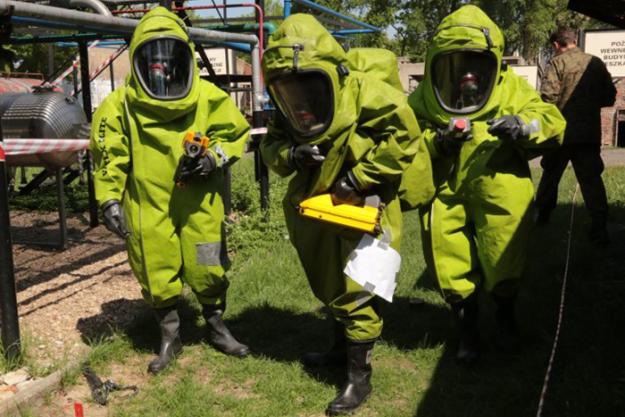
First responders from 16 counties across the world upgraded their skills in sampling and analysis
THE HAGUE, Netherlands – 18 May 2018 – First responders from 16 countries across the world upgraded their skills in sampling and analysis in a highly contaminated environment, during training in Częstochowa, Poland, held from 7 to 11 May.
The course – already in its sixth annual edition – was run jointly by the Organisation for the Prohibition of Chemical Weapons (OPCW) and the Polish Central School of the State Fire Service.
In his opening remarks, Deputy Director of the Department of Security Policy of the Polish Foreign Ministry, Mr Marcin Wróblewski, highlighted Poland’s commitment to continued cooperation with the OPCW for the achievement of the shared goal of a world free of chemical weapons.
Commander of the Central School, Jr. Brig. Piotr Placek, expressed that “the School, in cooperation with the OPCW, intends to continue offering this specialised course to all States Parties to the Chemical Weapons Convention”.
The participants learned about the theory and practice of sampling and analysis of chemical and biological substances – activities that are crucial for the acquisition and preservation of evidence during events involving chemical warfare agents and/or toxic industrial chemicals.
The training was supported by the Polish Ministry of Foreign Affairs in collaboration with the Polish Army and the Firefighter Corps of the city of Katowice.
The attendees represented the following OPCW Member States: Argentina, Barbados, Bulgaria, Costa Rica, Dominican Republic, Iraq, Jordan, Morocco, Peru, Philippines, Poland, Sri Lanka, Sudan, Uganda, Ukraine and Zambia.
Background
As the implementing body for the Chemical Weapons Convention, the OPCW oversees the global endeavour to permanently and verifiably eliminate chemical weapons. Since the Convention’s entry into force in 1997 – and with its 192 States Parties – it is the most successful disarmament treaty eliminating an entire class of weapons of mass destruction.
Over 96 per cent of all chemical weapon stockpiles declared by possessor States have been destroyed under OPCW verification. For its extensive efforts in eliminating chemical weapons, the OPCW received the 2013 Nobel Prize for Peace.
